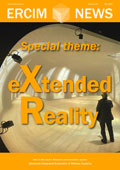Experts from across Europe gathered on 16 April 2024 in Brussels at the Maison Irène et Frédéric Joliot Curie to discuss the rapidly evolving landscape of generative AI and large language models (LLMs) at the ERCIM visionary event titled “Challenges and Opportunities of Foundational Models and Generative AI for Science and Society.”
Benoît Sagot of Inria opened the event with an overview of advancements in large language models (LLMs), focusing on the transformative effects of Transformer architectures. He discussed the trend towards larger models and the need for balancing data diversity with volume. Sagot also addressed concerns about the proprietary nature of training data, legal challenges, environmental impacts, and biases in these models that could reinforce societal stereotypes.
Following Sagot, Cecile Huet from DG Connect, European Commission, outlined the European GENAI4EU Iniative, which promises to boost the EU’s AI capabilities with a four billion Euro investment. The initiative aims to enhance supercomputing power, increase high-quality data availability, and support robust algorithmic development across various sectors including healthcare, climate change, and cybersecurity.
Liviu Stirba from DG Research and Innovation, European Commission, presented the activity and goals of the European Commission’s AI in Science group. He discussed AI’s transformative potential in scientific research. He underscored the need for an EU policy framework that optimizes AI use in scientific settings while ensuring competitiveness on a global scale.
In the session “Impact of Generative AI and LLMs on the Sciences”, Damien Gratadour of the Observatoire de Paris, explained the use of generative AI in building new brain models for giant astronomical telescopes, emphasizing the potential in fields like planet hunting and observing distant celestial objects.
Dong Nguyen of Utrecht University illustrated how LLMs could revolutionize the social sciences by enabling the analysis of large datasets, which could, for example, reveal trends in public opinion dynamics or track shifts in language use over time.
Mathieu Acher from INSA/Inria/CNRS/IRISA discussed the implications of LLMs in software engineering, highlighting their role in code generation and optimization. Acher pointed out how tools like GitHub Pilot and Llama-2 are integrating LLMs to transform coding, making advanced software development tools accessible to a broader audience.
The event continued with a session on “Generative AI and Future Perspectives” where Seán Ó hÉigeartaigh from the University of Cambridge presented on the need for stringent international cooperation in AI governance, highlighting the social and cognitive risks associated with AI, including the propagation of misinformation and the societal impacts of hate speech.
Haris Papageorgiou of the Institute for Language and Speech Processing discussed the role of LLMs as infrastructure for open science, highlighting both the potential benefits and risks, including issues related to data transparency and model biases. Anastasios Roussos from the Institute of Computer Science, Hellas (FORTH), explored the impact of generative AI in image and video synthesis, discussing both its innovative applications and the ethical concerns it raises, such as job displacement and copyright issues. Abdallah El Ali from Centrum Wiskunde & Informatica emphasized the importance of transparent and trustworthy human-AI interaction, discussing the implications of generative AI on content generation and public trust.
The event concluded with a panel discussion highlighting the necessity of integrating AI-generated content with human oversight to maintain information quality and addressed the critical role of multidisciplinary approaches in advancing AI technology effectively and ethically.
These discussions will lead to the creation of a vision document that could guide European research institutes and the European Commission in setting research priorities.
The event was organised by Han La Poutré (CWI, TU Delft), Vice President of ERCIM, together with Marie-Hélène Pautrat and Joost Geurts (Inria). and sponsored by CWI and Inria.










